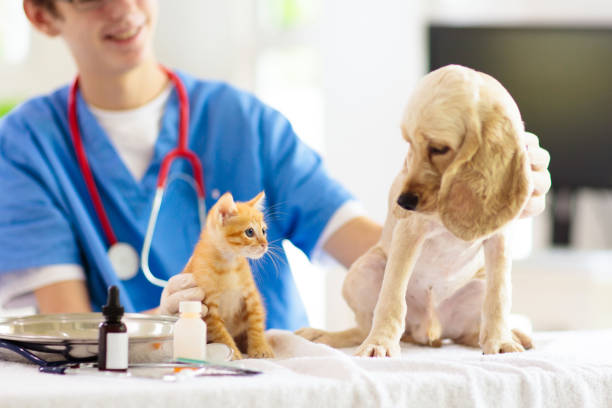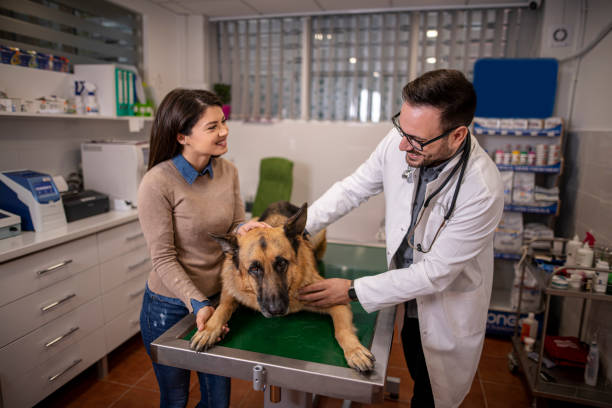Ensuring your pet’s health and well-being requires regular veterinary care and access to essential treatments. A comprehensive understanding of key veterinary services can help you make informed decisions about your pet’s healthcare needs. Here’s a guide to the essential veterinary services that play a crucial role in maintaining your pet’s health.
1. Routine Check-Ups
a. Annual Wellness Exams
- Health Assessment: Annual check-ups are vital for assessing your pet’s overall health. The vet will examine your pet’s physical condition, check vital signs, and review any behavioral changes or concerns.
- Early Detection: Regular exams help in the early detection of health issues, allowing for prompt treatment and better outcomes.
b. Vaccinations
- Core Vaccines: Essential vaccines protect against common and potentially severe diseases such as rabies, distemper, parvovirus, and adenovirus for dogs, and feline leukemia, feline herpesvirus, and calicivirus for cats.
- Booster Shots: Some vaccines require booster shots to maintain immunity. Your vet will schedule these based on your pet’s age, lifestyle, and health status.
2. Dental Care
a. Professional Cleanings
- Dental Exams: Regular dental check-ups and cleanings are crucial for preventing dental disease, which can lead to more serious health problems. Your vet will examine your pet’s teeth and gums for signs of plaque, tartar, and gingivitis.
- Cleaning Procedures: Professional dental cleanings involve scaling and polishing to remove plaque and tartar buildup. Anesthesia is usually required to ensure a thorough cleaning and to keep your pet comfortable.
b. Preventative Care
- Home Care: Regular brushing of your pet’s teeth and providing dental treats or toys can help maintain oral health between professional cleanings.
- Dental Health Products: Consult your vet for recommendations on dental care products such as toothpastes, rinses, or special diets designed to support oral health.
3. Parasite Control
a. Flea and Tick Prevention
- Preventative Medications: Regular use of flea and tick preventatives is essential to protect your pet from infestations and the diseases carried by these parasites.
- Treatment Options: Options include topical treatments, oral medications, and flea/tick collars. Your vet can recommend the best solution based on your pet’s lifestyle and local parasite prevalence.
b. Heartworm Prevention
- Monthly Preventatives: Heartworm disease is transmitted by mosquitoes and can be life-threatening. Monthly heartworm preventatives are crucial for protecting your pet from infection.
- Testing and Treatment: Regular testing for heartworms is recommended, especially if your pet is on preventative medication. If heartworm disease is detected, your vet will provide a treatment plan.
4. Diagnostic Services
a. Laboratory Testing
- Blood Work: Routine blood tests can provide valuable information about your pet’s internal health, including organ function, blood cell counts, and infection markers.
- Urinalysis: Testing urine samples helps in diagnosing urinary tract infections, kidney function issues, and diabetes.
b. Imaging
- X-Rays: Radiographs (X-rays) are used to examine internal structures, diagnose fractures, detect tumors, and evaluate organ conditions.
- Ultrasound: Ultrasound imaging provides detailed views of soft tissues and internal organs, aiding in diagnosing conditions such as tumors, pregnancies, or abdominal issues.
5. Surgical Services
a. Routine Procedures
- Spaying and Neutering: These common procedures prevent unwanted litters and can help avoid certain health issues and behavioral problems.
- Dental Surgeries: Procedures such as extractions or treatment for periodontal disease may be necessary based on your pet’s dental health.
b. Emergency and Specialized Surgeries
- Emergency Care: Immediate surgical intervention may be required for injuries, gastrointestinal obstructions, or life-threatening conditions.
- Specialized Surgeries: Complex surgeries, such as orthopedic procedures or tumor removals, are performed by veterinary surgeons with specialized skills and equipment.
6. Preventative Health Care
a. Nutrition and Weight Management
- Dietary Guidance: Your vet can provide advice on feeding practices, portion control, and selecting the right diet to meet your pet’s nutritional needs.
- Weight Monitoring: Regular weight checks and recommendations for weight management help prevent obesity and associated health problems.
b. Behavioral and Wellness Counseling
- Behavioral Advice: Addressing behavioral issues such as anxiety, aggression, or house training problems with professional guidance can improve your pet’s quality of life.
- Wellness Planning: Your vet can help develop a comprehensive wellness plan, including recommendations for exercise, mental stimulation, and preventive care.
7. Emergency Care
a. 24/7 Emergency Services
- Urgent Care: Many veterinary clinics offer emergency services or have partnerships with emergency care facilities for situations requiring immediate attention.
- Critical Care: Emergency services include treatments for severe injuries, poisoning, or acute illnesses that require urgent medical intervention.
b. First Aid and Home Care
- First Aid Training: Basic first aid knowledge can be helpful for managing minor injuries or health issues before seeking veterinary care.
- Home Care Advice: Your vet will provide guidance on post-surgical care, managing chronic conditions, and recognizing signs of distress or illness.
8. Holistic and Alternative Therapies
a. Complementary Treatments
- Acupuncture: Acupuncture can help manage pain, improve mobility, and support overall health in pets with chronic conditions.
- Chiropractic Care: Veterinary chiropractic care can address musculoskeletal issues and improve joint function.
b. Herbal and Nutritional Supplements
- Herbal Remedies: Consult your vet about herbal supplements that may support your pet’s health, such as those for joint support or digestive health.
- Nutritional Supplements: Supplements such as omega-3 fatty acids or probiotics can complement your pet’s diet and address specific health concerns.
9. Conclusion
Understanding the essential veterinary services available can help you provide the best care for your pet. Regular check-ups, preventative care, dental and parasite control, diagnostic services, and emergency care are fundamental components of maintaining your pet’s health. By staying informed about these key treatments and services, you can ensure that your furry friend receives comprehensive and compassionate care throughout their life.

